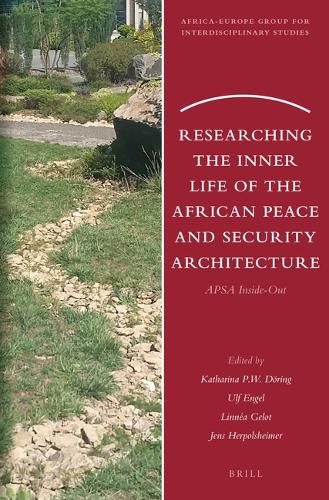Readings Newsletter
Become a Readings Member to make your shopping experience even easier.
Sign in or sign up for free!
You’re not far away from qualifying for FREE standard shipping within Australia
You’ve qualified for FREE standard shipping within Australia
The cart is loading…






This edited volume offers new insights into the inner life of the African Peace and Security Architecture (APSA) and introduces scholars of African security dynamics to innovative epistemological, conceptual and methodological approaches. Based on intellectual openness and an interest in transdisciplinary perspectives, the volume challenges existing orthodoxies, poses new questions and opens a discussion on actual research practice. Drawing on Global Studies and critical International Studies perspectives, the authors follow inductive approaches and let the empirical data enrich their theoretical frameworks and conceptual tools. In this endeavor they focus on actors, practices and narratives involved in African Peace and Security and move beyond the often Western-centric premises of research carried out within rigid disciplinary boundaries.
Contributors are Michael Aeby, Yvonne Akpasom, Katharina P.W. Doering, Ulf Engel, Fana Gebresenbet Erda, Linnea Gelot, Amandine Gnanguenon, Toni Haastrup, Jens Herpolsheimer, Alin Hilowle, Jamie Pring, Lilian Seffer, Thomas Kwasi Tieku, Antonia Witt, Dawit Yohannes Wondemagegnehu
$9.00 standard shipping within Australia
FREE standard shipping within Australia for orders over $100.00
Express & International shipping calculated at checkout
This edited volume offers new insights into the inner life of the African Peace and Security Architecture (APSA) and introduces scholars of African security dynamics to innovative epistemological, conceptual and methodological approaches. Based on intellectual openness and an interest in transdisciplinary perspectives, the volume challenges existing orthodoxies, poses new questions and opens a discussion on actual research practice. Drawing on Global Studies and critical International Studies perspectives, the authors follow inductive approaches and let the empirical data enrich their theoretical frameworks and conceptual tools. In this endeavor they focus on actors, practices and narratives involved in African Peace and Security and move beyond the often Western-centric premises of research carried out within rigid disciplinary boundaries.
Contributors are Michael Aeby, Yvonne Akpasom, Katharina P.W. Doering, Ulf Engel, Fana Gebresenbet Erda, Linnea Gelot, Amandine Gnanguenon, Toni Haastrup, Jens Herpolsheimer, Alin Hilowle, Jamie Pring, Lilian Seffer, Thomas Kwasi Tieku, Antonia Witt, Dawit Yohannes Wondemagegnehu